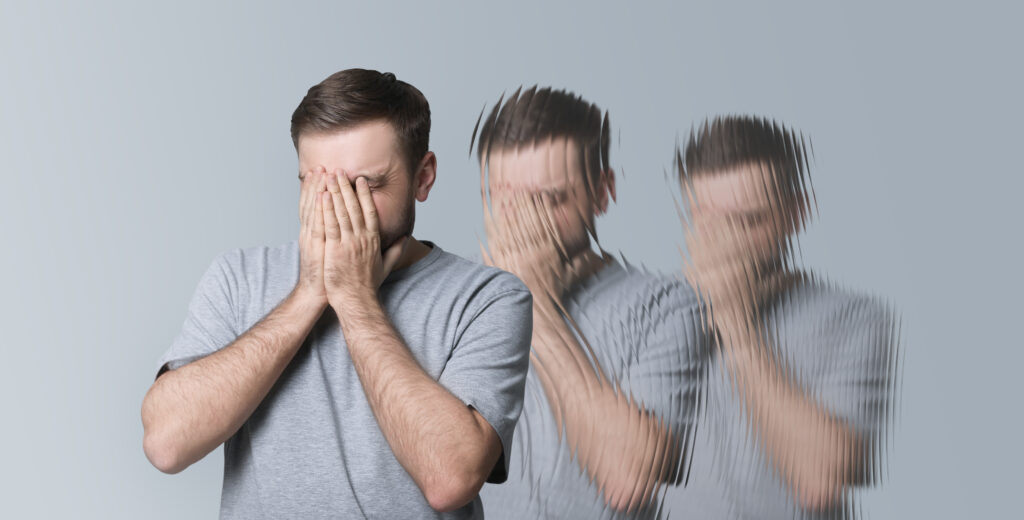
When someone you care about struggles with alcohol addiction, the journey toward recovery can feel overwhelming. Among the most concerning complications of severe alcohol withdrawal are alcohol hallucinations, a serious medical condition that affects approximately 1-2% of individuals with chronic alcohol dependence.
At Thoroughbred Wellness and Recovery, we understand the fear and confusion that accompany these frightening symptoms. We’re here to provide compassionate, evidence-based care when you need it most.
Alcohol hallucinations, medically known as alcoholic hallucinosis or alcohol-induced psychotic disorder, represent far more than temporary discomfort during withdrawal. These vivid, often disturbing perceptual experiences can signal a medical emergency requiring immediate professional intervention.
Understanding the signs, symptoms, and treatment options available can make the difference between successful recovery and potentially life-threatening complications.

Understanding Alcohol Hallucinations: More Than Withdrawal Symptoms
Alcohol hallucinations occur when the brain’s delicate neurochemical balance becomes severely disrupted after prolonged heavy drinking. Unlike the confusion and disorientation associated with delirium tremens (DTs), individuals experiencing alcoholic hallucinosis typically maintain clear consciousness while experiencing vivid auditory, visual, or tactile hallucinations.
The National Institute on Alcohol Abuse and Alcoholism recognizes this condition as a distinct form of alcohol withdrawal syndrome, affecting the nervous system through complex interactions between neurotransmitters like dopamine, GABA, and glutamate.
When someone abruptly stops drinking alcohol after chronic consumption, their brain struggles to readjust, creating the perfect storm for these distressing symptoms.
At Thoroughbred Wellness and Recovery, our medical professionals understand that alcohol hallucinations represent a critical point in someone’s journey with alcohol use disorder (AUD). These symptoms typically emerge 12-48 hours after the last drink, making early recognition and intervention essential for preventing more severe complications.
Recognizing the Signs: Types of Alcohol Hallucinations
It’s a terrifying reality that many people don’t realize: alcohol, a substance often associated with relaxation and celebration, can lead to severe and disturbing psychological effects, including hallucinations.
While not everyone who drinks will experience them, alcohol-related hallucinations are a clear sign of severe alcohol dependence and withdrawal, indicating a critical need for immediate medical attention.
Understanding the different types of alcohol hallucinations is crucial for recognizing these dangerous symptoms in yourself or a loved one, and for seeking the urgent help required to prevent further harm.
Auditory Hallucinations: The Most Common Experience
The majority of individuals experiencing alcohol-related psychosis report auditory hallucinations, hearing voices, sounds, or conversations that aren’t present. These voices often carry accusatory, threatening, or commanding tones, frequently focusing on the person’s drinking behavior or personal failures.
Unlike schizophrenia, people with alcoholic hallucinosis often retain some awareness that these voices aren’t real, though the experience remains deeply distressing.
Visual Hallucinations: Seeing the Unseen
Visual hallucinations during alcohol withdrawal can range from simple flashes of light to complex, formed images. Individuals might see shadows moving, people who aren’t there, or objects changing shape and size.
These symptoms can be particularly frightening and may contribute to agitation and behavioral changes that require immediate medical attention.
Tactile Hallucinations: Feeling What Isn’t There
Tactile hallucinations involve feeling sensations on the skin without any external stimulus. The most common experience is formication—the sensation of insects crawling on or under the skin.
This can lead to excessive scratching, self-harm behaviors, and extreme distress that compounds the overall withdrawal experience.

The Medical Mechanisms Behind Alcohol Hallucinations
Understanding why alcohol hallucinations occur requires examining the profound neurological changes that chronic alcohol consumption creates in the brain. When someone engages in heavy drinking over extended periods, their brain adapts by altering neurotransmitter production and receptor sensitivity.
Chronic alcohol exposure suppresses the brain’s natural production of GABA, the primary inhibitory neurotransmitter, while simultaneously increasing glutamate activity.
This creates a state of neurological hyperexcitability that becomes unmasked during withdrawal. Additionally, dopamine dysfunction in the brain’s reward pathways contributes to the psychotic symptoms, including hallucinations.
Thiamine deficiency, common in individuals with alcohol dependence, further exacerbates these neurological complications. This vitamin B1 deficiency can lead to Wernicke-Korsakoff syndrome and other serious neurological conditions if left untreated.
At Thoroughbred Wellness and Recovery, our evidence-based approach addresses these underlying neurochemical imbalances through comprehensive medical detoxification protocols that prioritize both safety and comfort during the withdrawal process.
Treatment Options: A Comprehensive Approach to Recovery
Using various options, from traditional therapies and medication to innovative holistic practices, we want to equip individuals and their loved ones with the knowledge to make informed decisions on their journey toward healing and wellness.
Medical Detoxification: The Foundation of Safe Withdrawal
When alcohol hallucinations occur, immediate medical intervention becomes essential. Our medical detox programs provide 24/7 nursing oversight and physician supervision to ensure safe withdrawal management.
The treatment typically involves carefully monitored benzodiazepines to restore GABA function and reduce central nervous system hyperexcitability.
For individuals experiencing persistent hallucinations, our medical professionals may prescribe antipsychotics such as haloperidol or atypical antipsychotics like risperidone. These medications help stabilize dopamine function while the brain readjusts to functioning without alcohol.
Nutritional Support and Medical Monitoring
Thiamine supplementation forms a critical component of our treatment approach, as vitamin B1 deficiency significantly contributes to alcohol-related neurological complications.
Our medical team provides high-dose thiamine therapy alongside comprehensive vitamin and mineral supplementation to support neurological healing.
Regular monitoring of vital signs, electrolyte levels, and neurological status ensures that complications are identified and addressed immediately.
This level of medical oversight is particularly important given that alcohol withdrawal symptoms can progress to life-threatening conditions like delirium tremens.
Behavioral Therapy and Long-Term Recovery Support
Once the acute withdrawal phase stabilizes, our comprehensive treatment programs address the underlying alcohol use disorder through evidence-based behavioral therapies.
- Our Cognitive Behavioral Therapy (CBT) programs help individuals identify triggers, develop coping strategies, and build the skills necessary for sustained recovery.
- Our Dialectical Behavior Therapy (DBT) sessions focus on emotion regulation and distress tolerance—essential skills for managing the psychological challenges that often accompany recovery from severe alcohol dependence.
- For individuals with trauma histories that may have contributed to their substance abuse, our EMDR Therapy provides specialized treatment for underlying psychological wounds.

Thoroughbred Wellness and Recovery’s Specialized Programs
Our specialized programs are designed to address a wide range of mental health and substance use challenges with tailored approaches that prioritize personal growth and healing.
Our diverse offerings, from intensive outpatient programs to holistic therapies, empower participants to cultivate healthy coping mechanisms, enhance their overall well-being, and achieve sustainable recovery.
Partial Hospitalization Program (PHP)
Our PHP offers 30 hours per week of intensive therapeutic services while allowing individuals to return home each evening. This program is ideal for those who have completed medical detoxification and need comprehensive support while transitioning back to daily life. The program includes individual therapy, group sessions, medication management, and life skills training.
Intensive Outpatient Program (IOP)
Our IOP provides 9-15 hours of weekly therapeutic services for individuals balancing treatment with work or family responsibilities. Available in morning, afternoon, and evening tracks, this program offers flexibility while maintaining the intensive support necessary for recovery from alcohol-related complications.
Dual Diagnosis Treatment
Many individuals experiencing alcohol hallucinations also struggle with co-occurring mental health conditions such as depression, anxiety, or PTSD. Our dual diagnosis treatment programs address both the substance use disorder and underlying mental health conditions simultaneously, providing integrated care that improves long-term outcomes.
The Consequences of Untreated Alcohol Hallucinations
When alcohol hallucinations go untreated, the consequences can be severe and potentially life-threatening. Without proper medical intervention, these symptoms may progress to delirium tremens, a condition with mortality rates reaching 5-25% if left untreated.
The risk factors for this progression include previous withdrawal seizures, concurrent medical conditions like liver disease, and the absence of appropriate medical supervision.
Beyond the immediate medical risks, untreated alcohol-related psychosis can lead to persistent psychiatric symptoms, with 10-20% of individuals developing chronic hallucinosis that mimics schizophrenia.
The psychological trauma of experiencing untreated hallucinations often contributes to increased suicide risk and reluctance to seek future treatment.
Social and functional consequences include relationship deterioration, employment loss, and legal complications resulting from impaired judgment during psychotic episodes.
The longer treatment is delayed, the more challenging recovery becomes, as the brain’s neuroplasticity decreases and psychological barriers to treatment increase.

Clear Your Mind and Body with Us
If you or a loved one is experiencing alcohol hallucinations or other severe alcohol withdrawal symptoms, immediate professional help is essential. These symptoms represent a medical emergency that requires specialized care from healthcare professionals experienced in addiction treatment and withdrawal management.
At Thoroughbred Wellness and Recovery, our compassionate team of medical professionals, licensed therapists, and addiction specialists understands the complexity of alcohol-related complications. We provide comprehensive, evidence-based treatment that addresses immediate medical needs and long-term recovery goals.
Don’t let alcohol hallucinations or other withdrawal complications prevent you from seeking the help you deserve. Recovery is possible, and with proper medical care and comprehensive treatment, individuals can overcome even the most challenging aspects of alcohol dependence.
Contact Thoroughbred Wellness and Recovery today at 678)-726-5503 to speak with our admissions team and begin your journey toward lasting recovery and improved well-being.









